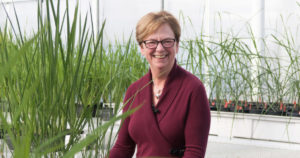
Colorado State University’s College of Agricultural Sciences will lead a national effort to set priorities for the USDA’s climate change research for the next decade.

CAS researchers recently received funding to develop a National Climate Change Roadmap (NCCR) and Implementation Plan for the USDA’s National Institute of Food and Agriculture. The $300,000 grant will support a National Climate Change Working Group featuring a wide variety of experts — including Becca Jablonski, associate professor and food systems economist and co-lead of the Food Systems Initiative, and Courtney Schultz, associate professor of forest and natural resource policy from the Warner College of Natural Resources.
“This is really a unique opportunity to help inform the next decade of research into climate change,” said project leader Gene Kelly, a professor of pedology at College of Agricultural Sciences and the deputy director/associate dean of Extension for the Colorado Agricultural Experiment Station.
Identifying the right priorities, people
The focus has included a broad array of agricultural production systems and discovering ways to create climate resiliency in our natural and agricultural ecosystems. For U.S. Agriculture to sustain viability and competitiveness, new innovations are needed with data and insights gleaned from critical innovations, especially as energy demands and international conflicts create new challenges and opportunities for agriculture.
“To guide identification of experts, and to help those experts frame questions for the roadmap, we posed five very broad themes that address the challenges and opportunities around climate change. These themes range from adaptation and mitigation to nutrition security and workforce development,” said Jan Leach, the co-project leader who is a University Distinguished Professor and CAS research associate dean. “Another one of the key things that we’re really concerned about is the disproportionate impact of climate change on underrepresented groups,” Kelly said. “We’re very interested in research that would address that issue.”

That also meant finding researchers from a variety of perspectives and organizations across the academic spectrum, including tribal universities and 1890 Land-Grant Institutions, was also critical, he said.
It also meant finding the best experts working on climate research from the ground up — literally, from soil carbon capture to the satellites that aid in remote sensing to improve irrigation efficiency — and then ask them to be, as Kelly put it semi-jokingly, “really reckless with their disciplinary boundaries.”
“By that I mean, if you’re a soil scientist, we don’t want you to only think about working with soil science,” he explained. “I want you to look at where the issues overlap with scientists in hydrology or in plant sciences or in food systems.”
The program has over 100 researchers from across the country working to identify key recent discoveries and advances as well as critical gaps. In June, representatives will meet at the CSU Spur campus to finalize the priorities that will be used to create a road map for climate change research in agriculture and natural resources. Using this data, Kelly and Leach will develop an implementation plan to be presented to NIFA later in the fall.
A ticking clock
But Kelly said he knows that when it comes to climate change, the clock is ticking.
“Policymakers and practitioners in most fields, including agriculture and the environment, often make decisions based on insufficient evidence,” he said. “We need to prioritize the critical research being done at our land-grant universities because we know that what we’re doing now is more important than what we’re going to be doing in 10 years.”
Kelly admitted that creating a road map of this magnitude has been a bit nerve wracking. A key premise of this approach, which will receive input from more than 300 scientists, is that the team forms an interdependent unit, whose collective intellectual inputs and productivity is greater than the sum of its individuals.
“There have been moments of, what if we fail?” he said. “It’s a little risky trying to manage such a large and diverse group of scientists. We are partnering with the Meridian Institute who will be facilitating the working groups. They are excellent.”
Handing over the keys for the next map
Five years down the road, Kelly said he hopes they can hand another group the roadmap they’ve created, give them the keys to the process, and let them create the next map.
“The blueprint that we’re going to provide NIFA with is actually a living document that other organizations will be able to go back to and do the same exact thing looking at what the climate change research needs will be for the next five or 10 years.”